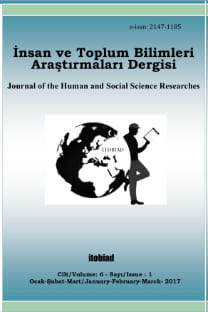Küreselleşmenin Ekonomik Büyüme Üzerindeki Etkisi: E7 Ülkeleri İçin Bir Uygulama
Küreselleşme, Ekonomik Büyüme, E7, Panel Veri Analizi, KOF Endeksi
The Impact of Globalization on Economic Growth: An Application for E7 Countries
Globalization, Economic Growth, E7, Panel Data Analysis, KOF Index,
___
- Altıner, A., Bozkurt, E. & Toktaş, Y. (2018). Küreselleşme ve Ekonomik Büyüme: Yükselen Piyasa Ekonomileri İçin Bir Uygulama. Finans Politik & Ekonomik Yorumlar, 639, 117 – 162.
- Aytekin, İ. (2013). Küreselleşme ve Ekonomik Küreselleşme. Bitlis Eren Üniversitesi Sosyal Bilimler Dergisi, 1(2), 123-134.
- Bakan, S. & Kocağ, E. (2012). Küreselleşmenin Azgelişmiş Ülkelere Etkileri. Hukuk ve İktisat Araştırmaları Dergisi, 4(1), 283-292.
- Barış, S. & Barış, A. (2018). Küreselleşme ve Ekonomik Büyüme İlişkisi: Avrupa Birliği Ülkelerinden Deliller. Proceedings of 4th SCF International Conference on Economics and Social Impacts of Globalization and Future Turkey-European Union Relations, 63-73.
- Bayar, F. (2008). Küreselleşme Kavramı ve Küreselleşme Sürecinde Türkiye. Uluslararası Ekonomik Sorunlar Dergisi, 32, 25-34.
- Breusch, T. S. & Pagan, A.R. (1980). The Lagrange Multiplier Test and Its Applications to Model Specification in Econometrics. The Review of Ecoomic Studies, 47(1), Econometrics Issue, 239-253.
- Chang, C. P. & Lee, C.C. (2010). Globalization and Growth: A Political Economy Analysis for OECD Countries. Global Economic Review, 39(2), 151-173.
- Chang, C. P. & Lee, C.C. & Hsieh M.C. (2011). Globalization, Real Output and Multiple Structural Breaks. Global Economic Review, 40(4), 421- 444.
- Çelik, M.Y. & Ünsür, Z. (2020). Küreselleşme ve Büyüme İlişkisinin Dumitrescu-Hurlin Panel Nedensellik Testi İle Belirlenmesi. İzmir İktisat Dergisi, 35(1), 201-210.
- Dreher, A. (2006). Does Globalization Affect Growth? Evidence From a New Index of Globalization. Applied Economics, 38, 1091-1110.
- Dündar, S. & Küçükkaya, H. (2019). Küreselleşme ve İktisadi Kalkınma İlişkisi: Türkiye İçin Ampirik Bir Analiz. Balkan Sosyal Bilimler Dergisi 8( EUREFE ’19), 421-429.
- Eren, M. V. & Çütçü, İ. (2018). Küreselleşmenin Ekonomik Büyümeye Etkisi: Türkiye Üzerine Ekonometrik Bir Analiz. Siyaset, Ekonomi ve Yönetim Araştırmaları Dergisi, 6(1), 47-61.
- Giddens, A. (2009). Modernitenin Küreselleşmesi. Kudret Bülbül (Ed.), (Çev. Kudret Bülbül), Küreselleşme Temel Metinler içinde (161-168), Ankara: Orion Kitabevi.
- Gurgul, H. & Lach L. (2014). Globalization and Economic Growth: Evidence From Two Decades of Transition in CEE. Economic Modelling, 36, 99-107.
- Gygli, S., Florian H., Niklas P. & Jan-Egbert S. (2019). The KOF Globalisation Index – Revisited. Review of International Organizations, 14(3), 543-574.
- Hayaloğlu, P., Kalaycı, C. & Artan S. (2015) Küreselleşme Farklı Gelir Grubundaki Ülkelerde Ekonomik Büyümeyi Nasıl Etkilemektedir? Eskişehir Osmangazi Üniversitesi İİBF Dergisi, 10(1), 119- 152.
- Heshmati, A. & Lee S. (2010). The Relationship Between Globalization, Economic Growth and Income Inequality. Journal of Globalization Studies, 1(2), 87-117.
- Husain, I. (2000). Making Globalization Work for The Poor Case Study of Pakistan. EMP-CIDA Globalisation Project, Lahore University of Management Sciences, 1-28.
- İsviçre Ekonomi Enstitüsü (2020). https://kof.ethz.ch/en/forecasts-and-indicators/indicators/kof-globalisation-index.html (18.11.2020).
- Kaurin, V. & Simic, B. (2017). Globalisation and Growth: Empirical Evidence From CEE Countries. Economic and Social Development, (Book of Proceedings), Managerial Issues in Modern Business, Edit: M. Przygoda, M. Cingula, L. Yongqiang, 274-282.
- Kılıç, C. (2015). Effects of Globalization on Economic Growth: Panel Data Analysis for Developing Countries. Economic Insights – Trends and Challenges, 4(1), 1-11.
- Çakır, M.H. & İlhan, K. (2012). İşletme Sermayesi Unsurlarının Firma Değeri ve Karlılığı Üzerindeki Etkisinin BİST’de İşlem Gören Üretim Firmalarında 2000–2009 Dönemi İçin Analizi. Muhasebe ve Finansman Dergisi, 53, 69-86.
- Mutascu, M. & Fleischer, A. M. (2011). Economic Growth and Globalization in Romania. World Applied Sciences Journal, 12(10), 1691-1697.
- Olimpia, N. & Stela, D. (2017). Impact of Globalisation on Economic Growth in Romania: An Empirical Analysis of Its Economic, Social and Political Dimensions. Studia Universitatis Economic Series, Vasile Goldis, Western University of Arad, 27(1), 29-40.
- Pesaran, M. H. (2004). General Diagnostic Tests for Cross Section Dependence in Panels, University of Cambridge Working Paper (1229), 1-38.
- Rao, B. B. & Vadlamannati K. C. (2011). Globalization and Growth in The Low Income African Countries with Extreme Bounds Analysis. Economic Modelling, 28(3), 795-805.
- Samimi P. & Jenatabadi, H.S. (2014). Globalization and Economic Growth: Empirical Evidence on The Role of Complementarities. PLoS ONE, 9(4), https://journals.plos.org/plosone/article?id=10.1371/journal.pone.0087824#s2 (12.11.2020).
- Suci, S. C., Asmara, A. & Mulatsih, S. (2015). The Impact of Globalization on Economic Growth in ASEAN. International Journal of Administrative Science&Organization, 22(2), 79-87.
- Yerdelen Tatoğlu, F. (2018). Panel Zaman Serileri Analizi. İstanbul: Beta Basım Yayım.
- Yerdelen Tatoğlu, F. (2018). Panel Veri Analizi. İstanbul: Beta Basım Yayım.
- WDI, https://databank.worldbank.org/source/world-development-indicators (22.10.2020).
- Ying, Y. H., Chang, K. & Lee, C. H. (2014). The Impact of Globalization on Economic Growth. Romanian Journal of Economic Forecasting, 17(2), 25-34.
- ISSN: 2147-1185
- Yayın Aralığı: Yılda 4 Sayı
- Başlangıç: 2012
- Yayıncı: Mustafa SÜLEYMAN ÖZCAN
Bankaya Özgü Faktörlerin Banka İstikrarı Üzerindeki Etkileri: Türk Bankacılık Sektörü Örneği
Sınır, İdeoloji ve Milliyetçilik: Yöntemsel Milliyetçilik İdeolojisinin İnşasında Sınırlar
Ambalaj Tedarikçi Seçim Probleminin Çözümü İçin Hibrit Çok Kriterli Bir Karar Verme Yöntemi Önerisi
Cengiz Aytmatov’un “Toprak Ana” Eserinin “Ekoeleştiri” Bağlamında İncelenmesi
Cıldız İSMAİLOVA, Emrah ALTIOK
Milli Gelirin Kentleşme ve Enerji Tüketimi ile İlişkisi: Türkiye Örneği
Yusuf UĞURHAN, İbrahim Halil YAŞAR
Suriyelilerin Türkiye’ de Doğan Bebeklerinin Hukuki Statüsü ve Vatandaşlık Koşulları
Firmalarda Bilgi İletişim Teknolojileri Kullanımı-Betimsel Analiz: Türkiye Örneği
Tarımsal Destek Ödemeleri ile Tarımsal Üretim Düzeyi Arasındaki Nedensellik İlişkisi: Türkiye Örneği
